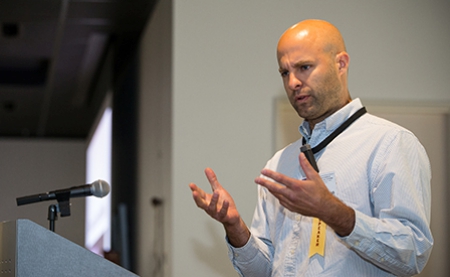Publisher's note: The author of this post, Kathy Muse, is a contributor to ECU News Services.
ECU program reaches out to enhance writing skills at all grade levels
If organizers of East Carolina University's first Eastern North Carolina Writing Symposium have their way, future classes of incoming students will arrive on campus with significant writing skills.
Held on campus Aug. 3, the symposium brought together 50 local educators from K-12 schools, community colleges and four-year institutions, discussing ideas for effective teaching methods to improve writing instruction at all grade levels. The event was part of ECU's "Write Where You Belong" initiative, created to better students' writing skills under the quality enhancement plan (QEP), an institutional requirement for improving student learning.
The QEP creates a curriculum for undergraduate students to receive writing instruction throughout their years at ECU and provides more focused guidance as students move into their major and career areas. In addition to required writing courses taken during freshman and sophomore years, students receive instruction through writing-intensive courses in their majors as upperclassmen.
J. H. Rose High School instructional coach Michael Flinchbaugh encouraged audience members to consider methods that will make materials more relevant to students.
"As we were planning the QEP, we recognized that, for this kind of curriculum to have the greatest impact, we also had to consider the writing curricula that students experienced at schools before they arrive at ECU," said Dr. Wendy Sharer, QEP director and professor of English. Sharer helped spearhead the event with Dr. Tracy Morse, director of writing foundations at ECU.
Speaker Michael Flinchbaugh, an instructional coach at J.H. Rose High School, shared ways to meet Common Core state standards beyond the five-paragraph essay. He said students at Rose participate in writing exercises that are more relatable, like creating notecard and cartoon video essays, infographics and digital portfolios.
"Standards are a small part of growing students as writers," Flinchbaugh said.
"We have to create instruction that is meaningful and engaging to them."
Flinchbaugh charged the audience to look at the Common Core standards and identify areas to create relevance for student writers. He urged listeners to focus on the values and practices of writers in the real world.
Other featured speakers were Dr. Tabitha Miller, composition coordinator at Pitt Community College, and Dr. Michael Carter, associate dean of the graduate school and former associate director of the campus writing and speaking program at North Carolina State University.
Attendees also participated in small, breakout groups to discuss writing expectations for students at different educational levels and to develop specific teaching activities that introduced students to the writing across the curriculum concept.
Lea Bingham, an instructor at Durham Technical Community College, said she wanted ideas on how to establish a similar collaboration among educators in her community.
"Community college students are so diverse in their needs," Bingham said.
"They all need different things and want different things from their education. That's another reason to learn about writing across the curriculum."
Pamlico County High School English Department Chair Rachel Gorton found inspiration in the ideas presented at the symposium and plans to pass them on to other teachers at her school.
"The concept of using technology to stimulate curiosity and communicate thoughts into writing form was beneficial," said Gorton.
"It was amazing."
ECU Provost Ron Mitchelson said the symposium is a good example of how ECU's commitment to student success extends beyond the physical footprint of the university into surrounding eastern North Carolina communities.
"You will walk away with improved tools and concepts," pledged Mitchelson, as he welcomed attendees.
"Good writing is at the heart of every promise we make."

ECU English professors Wendy Sharer, left, and Tracy Ann Morse chat during the Eastern North Carolina Writing Symposium held on campus Aug. 3. Sharer is director of ECU's Quality Enhancement Program and Morse is director of writing foundations at ECU. (Photos by Cliff Hollis)

























